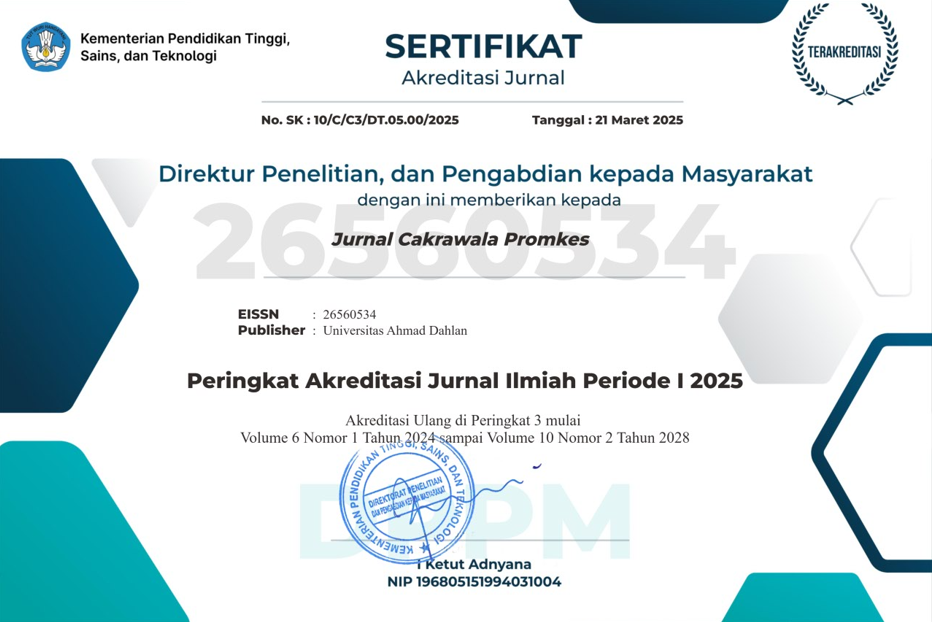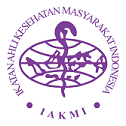Evaluasi program motivator ASI mobile imogiri (MAMI) di Puskesmas Imogiri I Bantul D.I.Yogyakarta
DOI:
https://doi.org/10.12928/promkes.v1i1.289Keywords:
Exclusive Breastfeeding, Support Group, Motivator Breasfeeeding ProgramAbstract
Background: Exclusive breastfeeding based on Government Regulation No. 33 of 2012 is breast milk given to infants since birth for six months, without adding and/or replacing with other foods or beverages (except medicines, vitamins and minerals). Nutrition improvement programs include several activities including nutritional surveillance, consultation, examination of toddlers by specialist doctors, monitoring of Exclusive Breastfeeding and Early Breastfeeding Initiation (IMD) as well as the empowerment of the Community Supporting Groups (KP-Ibu). The Imogiri (MAMI) Mobile ASI Motivator Program was formed in 2009 with its initial activities in the form of exclusive ASI mentoring activities with a background of frequent failures in exclusive breastfeeding in the first three months after the baby was born and 0-3 days the mother gave formula milk, then in the year 2015 was named as ASI Mobile Imogiri (MAMI) Motivator.
Method: This study aims to determine the input, process, output, outcome, feedback and environment in the MAMI program. This research type was qualitative with a descriptive approach using an in-depth interview method and observation. This research was conducted at Puskesmas Imogiri I Bantul Special Region of Yogyakarta with 11 informants, consisting of the Program Coordinator, Head of Puskesmas, Posyandu cadre and lactating mother.
Results: The number of human resources was sufficient but in quality is still said to be less. The public understands the importance of Exclusive Breast Milk, but overall the program has not run maximally. Children exclusively breastfed exclusively have better immunity than formula-fed children. The environment of breastfeeding mothers has an important role in exclusive breastfeeding.
Conclusion: The program is not running maximally yet.
References
2. Indonesia R. Undang-undang Republik Indonesia No. 36 Tahun 2009 Tentang Kesehatan. Undang-undang Republik Indonesia. Jakarta; 2009. p. 1–48.
3. Indonesia R. Peraturan Pemerintah Republik Indonesia Nomor 33 Tahun 2012 tentang Pemberian Air Susu Ibu Eksklusif. Jakarta: Sekretariat Negara Republik Indonesia; 2012.
4. Kementrian Kesehatan RI. Situasi Dan Analisis Asi Eksklusif. Jakarta: Pusat Data dan Informasi; 2014. p. 6.
5. Kesehatan K. Profil Kesehatan Indonesia 2016. Jakarta: Kementerian Kesehatan RI; 2017. p. 1–220.
6. Dinas Kesehatan Kabupaten Bantul. Profil Kesehatan Kabupaten Bantul Tahun 2017. Dinas Kesehatan Kabupaten Bantul. Bantul: Dinas Kesehatan Kabuaten Bantul; 2017. p. 1–50.
7. Alifah N. Analisis Sistem Manajemen Program Pemberian ASI Eksklusif di Wilayah Kerja Puskesmas Candilama Kota Semarang. J Kesehat Masy. 2012;1(2):1–11.
8. Hadil A, Sasmito C, Gunawan CI. Implementasi kebijakan Penyediaan Ruang Laktasi di Kota Malang. 2018;3(1):34–41.
9. Dasmar, Darmawansyah, Jafar N. Studi Evaluasi Program Dana Bantuan Operasional Kesehatan Di Kabupaten Luwu. J AKK. 2013;2(1):1–7.
10. Dwi R. Pedoman Pelayanan Gizi Puskesmas Karanganyar. Pedoman Pelayanan Gizi Puskesmas. Kebumen: Puskesmas Karanganyar; 2016.
11. Susanti N. Peran Ibu Menyusui yang Bekerja dalam Pemberian ASI Eksklusif bagi Bayinya. Egalita J Kesetaraan dan Keadlilan Gend. 2011;VI(2):165–76.
12. Baskoro A. ASI : Panduan Praktis Ibu Menyusui. Yogyakarta: Banyumedia; 2010.
13. Mashanafi T, Suparman E, Tendean H. Pengetahuan Ibu Hamil tentang Manfaat Pemberian ASI Eksklusif. J e-Clinic. 2015;3(3):2–6.
14. Notoatmodjo S. Promosi Kesehatan: Teori & Aplikasi. Jakarta: Rineka Cipta; 2010.
15. Nurlinawati, Sahar J, Permatasari H. Dukungan Keluarga Terhadap Pemberian ASI Eksklusif Pada Bayi di Kota Jambi. Jmj. 2016;4(1):77–86.
16. Friedman M. Buku Ajar Keperawatan Keluarga: Riset, Teori dan Praktik. 5th ed. Jakarta: Penerbit Buku Kedokteran ECG; 2017.
17. Illahi RK, Muniroh L. Gambaran Sosio Budaya Gizi Etnik Madura dan Kejadian Stunting Balita Usia 24-59 Bulan di Bangkalan. Media Gizi Indones. 2016;11(2):135–43.
18. Anik M. Inisiasi Menyusu Dini ASI Eksklusif. Jakarta: Trans Info Medika; 2012.
19. Azwar S. Sikap Manusia: Teori dan Pengukurannya. Yogyakarta: Liberti; 2010.
Downloads
Published
Issue
Section
License
Copyright (c) 2018 Rini Puji Astuti, Lina Handayani, Arzani Arzani

This work is licensed under a Creative Commons Attribution-ShareAlike 4.0 International License.
Authors who publish with JCP: Jurnal Cakrawala Promkes agree to the following terms:
- Authors retain copyright and grant the journal the right of first publication with the work simultaneously licensed under a Creative Commons Attribution License (CC BY-SA 4.0) that allows others to share the work with an acknowledgement of the work's authorship and initial publication in this journal.
- Authors are able to enter into separate, additional contractual arrangements for the non-exclusive distribution of the journal's published version of the work (e.g., post it to an institutional repository or publish it in a book), with an acknowledgement of its initial publication in this journal.
- Authors are permitted and encouraged to post their work online (e.g., in institutional repositories or on their website) prior to and during the submission process, as it can lead to productive exchanges, as well as earlier and greater citation of published work.

This work is licensed under a Creative Commons Attribution-ShareAlike 4.0 International License












